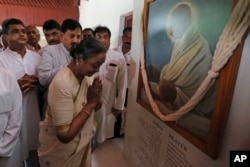A low-caste candidate handpicked by the Bharatiya Janata Party is expected to emerge as India’s new president and seal the grip of Hindu nationalists on power.
Ram Nath Kovind is expected to win the nation’s highest, although largely ceremonial, post, following an election Monday in which legislators cast votes.
The choice of the low profile, 71-year-old Kovind, is seen as an effort by Prime Minister Narendra Modi’s party to woo India’s Dalit or low castes before the 2019 general election.
The two-time parliament member and former governor of the eastern Bihar state has Hindu nationalist roots.
He is pitted against opposition candidate, Meira Kumar, but is the frontrunner as he has the support of a majority of state and federal lawmakers that make up the electoral college that votes in the president.
Prime Minister Modi, who was the first to cast his vote in parliament, has called Kovind “a strong voice for the poor, downtrodden and marginalized.”
Kovind’s nomination came as a surprise because he has not a national political veteran like many past presidents such as outgoing President Pranab Mukherjee. But the bid to catapult him to the nation’s top office is regarded an astute move by the BJP, which repeatedly points to his credentials as a symbol of the country’s low castes.
Low castes are at the bottom of Hinduism’s caste hierarchy and among India‘s poorest communities. Numbering about 200 million, this key electoral group can swing elections, but there has been some anger among Dalits due to sporadic attacks by cow protection groups on their members.
The BJP, whose traditional support lies among the upper castes, hopes to consolidate this vote as it prepares for elections two years from now.
“It’s a very clever card to play and he is going to win with a very good majority,” says independent political analyst, Neerja Chowdhury.
The main opposition has raised objections to Kovind because of his association with the right wing Rashtriya Swayamsevak Sangh (RSS), the ideological mentor of Modi's ruling BJP, which they eye with suspicion because they see it supporting the idea of a Hindu India and a threat to the nation’s secular values.
The president of the opposition Congress Party, Sonia Gandhi, called the contest for the nation’s top job “a clash of ideas and a conflict of disparate values” and appealed to lawmakers to cast a “vote of conscience.”
Kovind’s opponent, Meira Kumar, is also a member of the low castes and was India’s first woman speaker of parliament during the Congress Party’ rule. She said, “My fight is not against him, but the ideology he represents."
But political analysts say BJP’s pick for the top post is balanced. “They have chosen a person with a moderate face and not an aggressive Hindutva face,” says Chowdhury.
Although the president’s role is largely ceremonial, he plays a decisive role in in determining who forms the government when national elections do not produce clear results.
The results of the presidential vote are expected Thursday.





